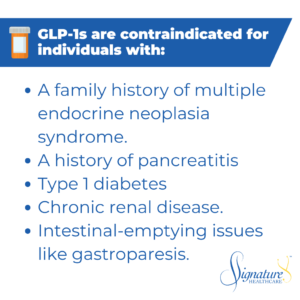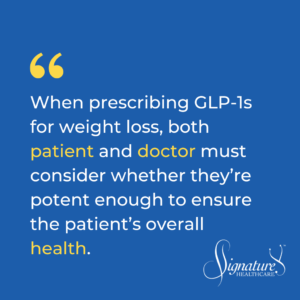Ozempic Is a Household Name… But Are GLP-1s Right for YOU?
We’re all familiar with household-name medications like Prozac, the groundbreaking antidepressant, and Viagra, a game-changer for patients with erectile dysfunction.
But in my 25+ years of practice, the most transformative medications I’ve seen in terms of effectiveness and safety are the class of drugs known as glucagon-like peptide 1 (GLP-1) agonists.
Developed 20 years ago to treat diabetes, GLP-1s recently hit the market rebranded as weight-loss drugs, and they’ve trended in search engines and with patients ever since.
Previous weight-loss medications often had disagreeable side effects, tolerability issues, and safety concerns. But GLP-1 medications like Ozempic, Wegovy, Mounjaro, and Zepbound safely and effectively decrease appetite and improve blood sugar levels. Patients shed as much as 15% of their body weight within one year. And just as impressive, the weight loss appears permanent for most.
We’ve never had medication in our weight-loss tool kit with the power of GLP-1s. So, unsurprisingly, we get many requests to try them.
Who Shouldn’t Use a GLP-1?
For patients who’d like to drop a few pounds, we first try natural approaches like diet and exercise. However, occasionally, individuals who don’t need the power of a GLP-1 nevertheless request a prescription (Viagra had similar fans when first introduced).
Despite their ability to melt pounds, GLP-1 medicines aren’t a weight-loss shortcut for the masses. They’re intended for use by clinically obese individuals who’ve struggled unsuccessfully with their weight over the long term, whether due to their genetics or lifestyle changes that didn’t work. For these patients, GLP-1s can be a superior solution.
When patients who don’t need a GLP-1 view it as an “easy button” for weight loss, it creates supply shortages and prevents people who do need the drug from obtaining it. Also, the “easy button” patient may experience extreme and unnecessary weight loss, as well as hypoglycemic episodes, dehydration, weakness, fainting, dizziness, or lightheadedness.

Before We Prescribe
For patients who meet the general criteria for a GLP-1 medication, we carefully consider several other factors before prescribing.
GLP-1s are contraindicated for individuals with:
- A family history of multiple endocrine neoplasia syndrome. GLP-1s work via the endocrine system and may trigger malignancies in these patients.
- A history of pancreatitis. GLP-1s also work through the pancreas and could prompt this condition in patients prone to it.
- Type 1 diabetes. While GLP-1s can be effective for type 2 diabetics, usage for type 1 is still considered off-label and may increase the risk of hypoglycemia (low blood sugar) in type 1. For patients with type 2 who struggle with weight control, we often start their regimen with metformin, then add GLP-1 as a second-line drug.
- Chronic renal disease. GLP-1s may dehydrate these patients, exacerbating renal insufficiency.
- Intestinal-emptying issues like gastroparesis. GLP-1s slow down stomach emptying and could encourage stomach paralysis in people at risk.
Lifestyle: Still a Major Component
When prescribing GLP-1s for weight loss, both patient and doctor must consider whether they’re a good fit for the patient’s overall health. Inevitably, lifestyle — a focused approach to adequate exercise and eating right — is still vital to all-around good health.
When we discuss GLP-1s with our patients:
- We cover particulars about their diabetic condition.
- We review any medications they previously tried to use to control the volume of food they consume.
- We ask about their chronic conditions, such as reflux, diarrhea, or constipation. GLP-1s can further aggravate recurrent stomach or abdominal pain.
- We educate them about how GLP-1s suppress the desire to eat by slowing the digestive tract. This slowdown decreases food intake, so overeaters and frequent snackers feel full more quickly (or feel poorly if they consume too much). We also discuss the significance of lifestyle changes — increased physical activity, dietary adjustments, and the importance of meeting with our nutritionist.
- We advise them that active weight loss will likely deplete some muscle protein, decreasing muscular strength. This is another essential reason patients on GLP-1 medication must maintain a fitness and exercise program and stay hydrated.
- We warn them about possible side effects of GLP-1s — nausea, vomiting, diarrhea, constipation, and abdominal cramping.

Ready to Talk About Weight Loss?
At Signature Healthcare, we’re enthused by the promise of GLP-1s. We’re here to help you create a winning weight-loss plan focusing on your overall health.
Our physicians guide you through using a GLP-1 medication, then meet with you regularly to monitor your usage and ensure that hydration, digestive function, and other factors stay on track.
Or, if we determine GLP-1s aren’t a good fit for you, we can help you find a lifestyle plan for successful weight loss.
Reach out for an in-depth chat with your Signature Healthcare doctor.

Michael Warren Smith, MD
Dr. Michael Smith, MD, a dedicated internal medicine specialist, has been serving Charlotte families with distinction for over 19 years. A Wake Forest University alumnus and a devoted family man, Dr. Smith balances his professional life with a passion for golf, beach travels, Peloton rides, and cheering for ACC teams, alongside his wife, Dr. Erin Smith, their two children, and Bogey, their Golden Retriever.

